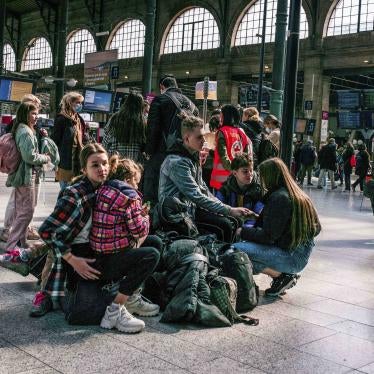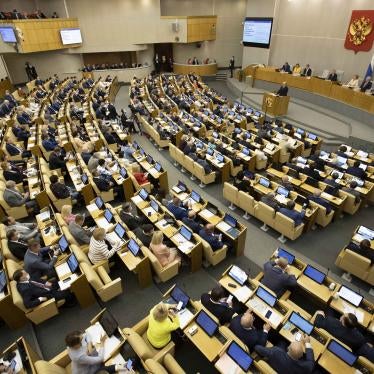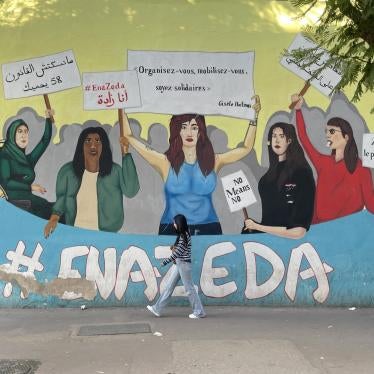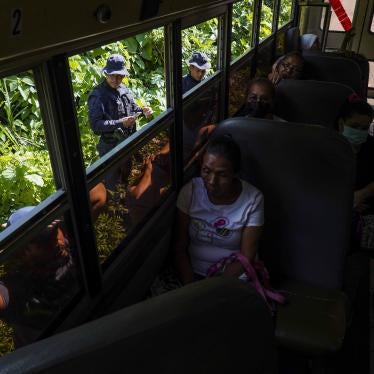(Kyiv, December 22) – Russian forces forcibly disappeared Iryna Horobtsova, a resident of Kherson, Ukraine, in May 2022, and are understood to have unlawfully transferred her to Russian-occupied Crimea, where they are holding her incommunicado, Human Rights Watch said today.
Horobtsova, 37, is an IT expert. Her family says that she was detained on May 13 by Russian forces, and that Russian authorities have since refused to provide official information regarding her whereabouts or fate. In late June, Russian security services, in a letter to a lawyer in Crimea, acknowledged Horobtsova’s detention but provided no information about where she was being held. Her possible location only came to light in November, when a woman told the family she had been Horobstova’s cellmate during September and October in a detention facility in Simferopol, Crimea.
“Russia’s occupation of Kherson has ended, but it is a lasting ordeal for Iryna Horobtsova and her family,” said Yulia Gorbunova, senior Ukraine researcher at Human Rights Watch. “It is outrageous that Russian authorities have forcibly disappeared Horobtsova for seven months and may be holding her in Crimea without contact with the outside world. Russian authorities should immediately release Horobtsova and other Ukrainians they are holding unlawfully and allow them to return home.”
Russian forces occupied Kherson from March 2 to November 11, when Ukrainian forces re-established control over the city. Russian forces’ forcible disappearance of Horobtsova is consistent with other abuses, including other enforced disappearances, they committed during their occupation. In July, Human Rights Watch documented 42 cases in which Russian occupation forces in Khersonska and Zaporizka regions either forcibly disappeared civilians or otherwise held them arbitrarily, in some cases incommunicado, and tortured many of them.
Russian forces targeted, in particular, civil servants, pro-Ukraine activists and journalists, and other civilians presumed to oppose the occupation.
Russian authorities should urgently provide Horobtsova’s family with information on her whereabouts, Human Rights Watch said. Russia should release her, and in the meantime fully respect protections afforded to her as a civilian including granting her access to a lawyer of her choosing.
A Human Rights Watch researcher spoke to Horobtsova’s family and lawyer, who said that since February, Horobtsova had actively spoken out on social media against Russia’s war in Ukraine and the occupation of Kherson, attended pro-Ukraine protests in Kherson in March, and helped raise funds for medical assistance and transport for Kherson residents.
One family member said that on May 13, eleven men in Russian military uniforms, some wearing masks, arrived at the apartment in Kherson where she lived with her parents, retired physics teachers. Horobtsova was at home with her 75-year-old mother. Her father returned home shortly after.
Six men, who did not introduce themselves, searched the flat while the other five waited outside, near two cars marked with “Z,” the Russian government’s propaganda symbol of support for the war in Ukraine.
Russian forces confiscated three laptops and Horobtsova’s cell phone and told her family that she was being detained for questioning but that she would be home later that evening, her family said. Horobtsova left her apartment wearing light pajama pants and slippers.
When she did not return home the next day, her parents went to the Russian military command's office in Kherson. Officials there refused to confirm or deny whether Horobtsova was in their custody, and they refused to accept a care package her parents had brought for her. After that, the family made multiple inquiries for weeks at the office in Kherson but received no official updates. They also hired several lawyers in different areas of Ukraine to search for their loved one.
A Crimea-based human rights lawyer, Emil Kurbedinov, told Human Rights Watch that he started looking for Horobtsova after her family asked him to represent her. During that time, he filed information requests with Russia’s security services (FSB), Interior Ministry, and Federal Penitentiary Service .
On June 28, Kurbedinov received a response from the FSB department in Crimea that acknowledged Horobtsova had been detained for allegedly “resisting the special military operation.” The letter stated that a “decision about her” would be made “upon completion of the special military operation on the territories of Donetsk and Luhansk’ People’s Republics and Ukraine.” The letter neither identifies the detaining authority nor indicates her whereabouts
Responses from the Penitentiary Service and Defense Ministry th Kurbedinov also received in June claimed there was no such person in their systems.
In November, the woman who said she had shared a cell in Crimea with Horobtsova contacted Horobtsova’s family. She told them that shortly after detaining Horobtsova, Russian authorities transferred her to a pretrial detention facility in Simferopol, where she has presumably been held since, without charge, access to a lawyer, or any contact with the outside world.
The woman told a Human Rights Watch researcher that Russian security services detained her as she was fleeing Russia-occupied Kherson on September 14 and held her until October 13.
The woman said that she was traveling by car with her husband and children, planning to reach Georgia via Crimea. Russian security services stopped them in Armyansk, at the administrative border with Crimea, and detained her. They told her husband that they were taking her in for questioning and a lie detector test, and that he could collect her in the morning.
Instead, the woman was taken to pretrial detention facility number 1 in Simferopol. The woman was held there for a month, in a cell with Horobtsova, incommunicado and with no access to a lawyer. She was not charged, but repeatedly questioned about her alleged cooperation with the Ukrainian State Security Service. Her husband had no information about her whereabouts for three weeks, until Russian security services confirmed that they had her and were “checking up on her.” Upon receiving this confirmation, he went to the detention facility with a parcel with food and clothes for his wife but was told that no such person was there.
The woman said that Horobtsova had been held in solitary confinement for over three months, before they were cellmates. She said that when they first met and throughout their time together in the cell, Horobtsova appeared very depressed and anxious and that she “sat and cried all the time.”
Horobstova had told her that after she was detained in Kherson, she was blindfolded and transferred to Crimea, where she was interrogated twice about her pro-Ukraine position. Horobtsova also told her that her interrogators had placed an AK-rifle on the table in front of her and hung a clothing iron on the wall in the interrogation room, threatening to use it on her if she did not “tell [them] everything.”
Kurbedinov, the lawyer, told Human Rights Watch that he visited the detention facility twice, but the facility administrators denied that Horobtsova was there.
“Special services are using this tactic to break her ... make her think she is alone and that no one is thinking about her or working on her case," Kurbedinov said. “My main goal right now is to ensure that she is allowed to call her parents and see her lawyer.”
Between February and July, The United Nations Human Rights Monitoring Mission in Ukraine documented 407 cases of conflict-related enforced disappearances and arbitrary detention of civilians by Russian forces. The UN mission located 76 places used by Russian forces or by the Russian Federation to detain civilians for conflict-related reasons, including four facilities in Crimea.
The laws of war allow a warring party in an international armed conflict to detain combatants as prisoners of war and to intern civilians in noncriminal detention if their activities pose a serious threat to the security of the detaining authority. However, the authority must release them as soon as the reasons that necessitated the civilian’s internment no longer exist.
An enforced disappearance occurs when a person is deprived of their liberty and authorities refuse to acknowledge the detention or to disclose the fate or whereabouts of the detainee, placing them beyond the protection of the law. In an armed conflict, this may amount to or involve multiple war crimes, and when an enforced disappearance occurs with the intention of removing the detainee from the protection of the law for a prolonged period of time, it is prosecutable as a crime against humanity under the International Criminal Court’s statute.
International humanitarian law prohibits individual or mass forcible transfers of civilians from occupied territory to the territory of the occupying power, which may amount to a war crime. It also prohibits hostage-taking. Detaining civilians for the purpose of using them in future prisoner exchanges would constitute the war crime of hostage-taking.









